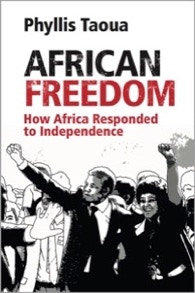African Freedom. How Africa Responded to Independence Cambridge University Press, 2018.
The push for independence in African nations was ultimately an incomplete process, with the people often left to wrestle with a partial, imperfect legacy. Rather than settle for liberation in name alone, the people engaged in an ongoing struggle for meaningful freedom. Phyllis Taoua shows how the idea of freedom in Africa today evolved from this complex history. With a pan-African, interdisciplinary approach, she synthesizes the most significant issues into a clear narrative. Tracing the evolution of a conversation about freedom since the 1960s, she defines three types and shows how they are interdependent. Taoua investigates their importance in key areas of narrative interest: the intimate self, gender identity, the nation, global capital, and the spiritual realm. Allowing us to hear the voices of African artists and activists, this compelling study makes sense of their struggle and the broad importance of the idea of freedom in contemporary African culture.
Order here: ISBN 978-1-108-44616-7


Cape Coast, Ghana
Select publications
“Of Objects, Exhibit Spaces and Markets: Meschac Gaba's Museum of Contemporary African Art,” Transition Magazine, no. 119.
“Abderrahmane Sissako's Timbuktu and its Controversial Reception,” African Studies Review, vol. 58, no 2.
“The Effects of Censorship on the Emergence of Anti-Colonial Protest in France,” South Central Review, vol. 32, no. 1.
“Of Prisons and Freedom: Liberation in the Work of Assia Djebar,” World Literature Today (Nov.-Dec. 2012).
“The Postcolonial Condition,” The Cambridge Companion to the African Novel. Ed. Abiola Irele. (CUP, 2009).
“The Anti-Colonial Archive: France and Africa's Unfinished Business,” SubStance, Issue 102, vol. 32, no. 3.
“Performing Identity: Nations, Cultures and African Experimental Novels,” Journal of African Cultural Studies, vol. 14, no. 2.
“Passionate Engagements: A Reading of Sony Labou Tansi's Private Ancestral Shrine,” Research in African Literatures, vol. 31, no. 3.
Special Issues
Mongo Beti: L'oeuvre post retour d'exil, Études littéraires africaines, no. 42.
Ousmane Sembène, Études littéraires africaines, no. 30.
Sony Labou Tansi, Research in African Literatures, vol. 31, no. 3.
“This is highly accomplished. A very expansive and stimulating exploration of an enduring theme. A true labor of love.” —Tejumola Olaniyan
“..engaging book…the significance of African Freedom cannot be denied. ..this book is substantial. ….an enjoyable read.” —Kwaku Nti
“…this is a powerful and important book that opens up new perspectives on the history of the struggle for freedom in Africa, and it deserves a wide readership.” —Emma Hunter
“.. this is a fine work; it provides a comprehensive, perceptive and engaging intervention into the multifaceted concept and realities of freedom that continue to materially affect Africa. We are forced to challenge our own understanding of freedom and, through pan-African cultural case studies, rethink how we perceive the continent.” —Matt Graham
